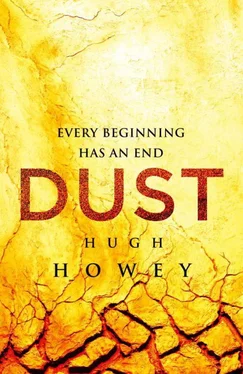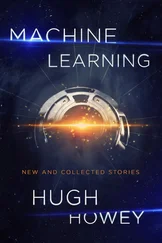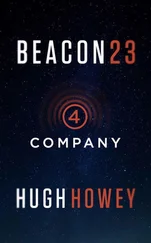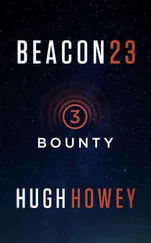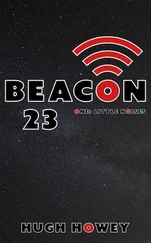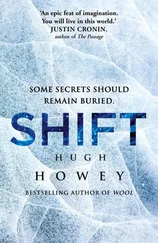“He managed to crack another server. It’s more of the same data, everything about its residents, every job they’ve had, who they’re related to, from birth to death. I don’t understand how those machines go from that information to this ranked list. It seems like a bunch of noise, like there has to be something else.”
He produced a sheet of folded paper, a new printout of the rankings of the silos. Charlotte cleared a space on the workbench, and he smoothed the report.
“See? The order has changed again. But what determines that?”
She studied the report while she ate, and Donald grabbed one of his folders of notes. He spent a lot of time working in the conference room where he could spread things out and pace back and forth, but Charlotte preferred it when he sat at that drone station. He would sit there for hours sometimes, going through his notes while Charlotte worked on the radio, the two of them listening for chatter among the static.
“Silo six is back on top again,” she muttered. It was like reading the side of a cereal box while she ate, all those numbers that made little sense. One column was labeled Facility , which Donald said was what they used to call the silos. Beside each silo was a percentage like a massive dose of daily vitamins: 99.992%, 99.989%, 99.987%, 99.984% . The last silo with a percentage read 99.974% . Every silo below this was marked off or had N/A listed. Silos 40, 12, 17, and a handful of others were included in that latter category.
“You still think the one on top is the only one that gets to survive?” she asked.
“I do.”
“Have you told these people you’re talking to? Because they’re way down the list.”
He just looked at her and frowned.
“You haven’t. You’re just using them to help you figure all this out.”
“I’m not using them. Hell, I saved that silo. I save it every day that I don’t report what’s going on over there.”
“Okay,” Charlotte said. She returned to her eggs.
“Besides, they probably figure they’re using me. Hell, I think they get more out of our talks than I do. Lukas, the one who heads up their IT, he peppers me with all these questions about the way the world used to be—”
“And the mayor?” Charlotte turned and studied her brother closely. “What does she get out of it?”
“Juliette?” Donald thumbed through a folder. “She enjoys threatening me.”
Charlotte laughed. “I would love to hear that.”
“If you get that radio sorted, you might.”
“And then you’ll spend more time working down here? It would be good, you know. Lessen the risk of being recognized.” She scraped her plate with her fork, not willing to admit the real reason she wanted him down there more was how empty the place felt when he was gone.
“Absolutely.” Her brother rubbed his face, and Charlotte saw how tired he was. Her gaze fell back to the numbers while she ate.
“It makes it seem arbitrary, doesn’t it?” she wondered aloud. “If these numbers mean what you think they mean. They’re functionally equivalent.”
“I doubt the people who planned all this look at it that way. All they need is one of them. It doesn’t matter which one. It’s like a bunch of spares in a box. You pluck one out, and all you care about is if it’ll work. That’s it. They just want to see everything is one hundred percent all the way down.”
Charlotte couldn’t believe that’s what they had in mind. But Donny had shown her the Pact and enough of his notes to convince her. All the silos but one would be exterminated. Their own included.
“How long before the next drone is ready?” he asked.
Charlotte took a sip of juice. “Another day or two. Maybe three. I’m really going light with this one. Not even sure if it’ll fly.” The last two hadn’t made it as far as the first. She was getting desperate.
“Okay.” He rubbed his face again, his palms muffling his voice. “We’re gonna have to decide before too long what we’re gonna do. If we do nothing, this nightmare plays out for another two hundred years, and you and I won’t last that long.” He started to laugh, but it turned into a cough. Donald fished into his coveralls for his handkerchief, and Charlotte looked away. She studied the dark monitors while he had one of his fits.
She didn’t want to admit this to him, but her inclination was to let it play out. It seemed as if a bunch of precision machines were in control of humanity’s fate, and she tended to trust computers a lot more than her brother did. She had spent years flying drones that could fly themselves, that could make decisions on which targets to hit, could guide missiles to precise locations. She often felt less like a pilot and more like a jockey, a person on a beast that could race along on its own, that only needed someone there to occasionally take the reins or shout encouragement.
She glanced over the numbers on the report again. Hundredths of a percentage point would decide who lived and who died. And most would die. She and her brother would either be asleep or long dead by the time it happened. The numbers made this looming holocaust seem so damn… arbitrary.
Donald used the folder in his hand to point at the report. “Did you notice eighteen moved up two spots?”
She had noticed. “You don’t think you’ve become too… attached, do you?”
He looked away. “I have a history with this silo. That’s all.”
Charlotte hesitated. She didn’t want to press further, but she couldn’t help herself. “I didn’t mean the silo,” she said. “You seem… different each time you talk to her.”
He took a deep breath, let it out slowly. “She was sent to clean,” he said. “She’s been outside.”
For a moment Charlotte thought that was all he was going to say on the matter. As if this were enough, as if it explained everything. He was quiet a pause, his eyes flicking back and forth.
“No one is supposed to come back from that,” he finally said. “I don’t think the computers take this into account. Not just what she survived, but that eighteen is hanging in there. By all accounts, they shouldn’t be. If they make it through this… you wonder if they don’t give us the best hope.”
“ You wonder,” Charlotte said, correcting him. She waved the piece of paper. “There’s no way we’re smarter than these computers, brother.”
Donald appeared sad. “We can be more compassionate than them,” he said.
Charlotte fought the urge to argue. She wanted to point out that he cared about this silo because of the personal contact. If he knew the people behind any of the other silos — if he knew their stories — would he root for them? It would be cruel to suggest this, however true.
Donald coughed into his rag. He caught Charlotte staring at him, glanced at the bloodstained cloth, put it away.
“I’m scared,” she told him.
Donald shook his head. “I’m not. I’m not afraid of this. I’m not afraid of dying.”
“I know you’re not. That’s obvious, or you would see someone. But you have to be afraid of something.”
“I am. Plenty. I’m afraid of being buried alive. I’m afraid of doing the wrong thing.”
“Then do nothing,” she insisted. She nearly begged him right then to put a stop to this madness, to their isolation. They could go back to sleep and leave this to the machines and to the God-awful plans of others. “Let’s not do anything,” she pleaded.
Her brother rose from his seat, squeezed her arm, and turned to leave. “That might be the worst thing,” he quietly said.
That night, Charlotte awoke from a nightmare of flying. She sat up in her cot, springs crying out like a nest of birds, and could still feel herself swooping down through the clouds, the wind on her face.
Читать дальше
